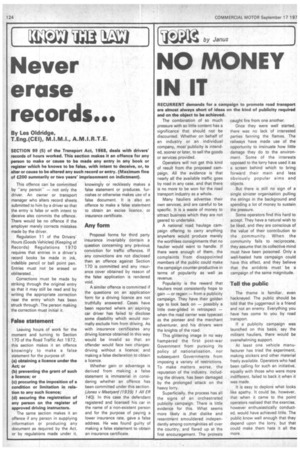Never erase records...
Page 126

If you've noticed an error in this article please click here to report it so we can fix it.
By Les Oldridge, T.Eng.(CEI), M.I.M.I., A.M.I.R.T.E.
SECTION 99 (5) of the Transport Act, 1968, deals with drivers' records of hours worked. This section makes it an offence for any person to make or cause to be made any entry in any book or register which he knows to be false, with intent to deceive, or, to alter or cause to be altered any such record or entry. (Maximum fine of £200 summarily or two years' imprisonment on indictment).
This offence can be committed by ''any person" — not only the driver. An owner or transport manager who alters record sheets submitted to him by a driver so that the entry is faISe or with intent to deceive also commits the offence. There would be no offence if the employer merely corrects mistakes made by the driver.
Regulation 11 of the Drivers' Hours (Goods Vehicles) (Keeping of Records) Regulations 1970 requires that entries in a driver's record books be made in ink, indelible pencil or ball point pen. Entries must not be erased or obliterated.
Corrections must be made by striking through the original entry so that it may still be read and by writing the appropriate correction near the entry 'which has been struck through. The person making the correction must initial it.
False statement
Leaving hours of work for the moment and turning to Section 170 of the Road Traffic Act 1972, this section makes it an offence knowingly to make a false statement for the purpose of: (a) obtaining a licence under the Act; or (b) preventing the grant of such a licence; or (c) procuring the imposition of a condition or limitation in relation to any such licence; (d) securing the registration of any person on the register of approved driving instructors.
The same section makes it an offence if any person in supplying information or producing any document as required by the Act, or by regulations made under it, knowingly or recklessly makes a false statement or produces, furnishes or otherwise makes use of a false document. It is also an offence to make a false statement to obtain an excise licence, or insurance certificate.
Any form
Proposal forms for third party insurance invariably contain a question concerning any previous conviction for traffic offences. If any convictions are not disclosed then an offence against Section 170 is committed and any insurance cover obtained by reason of the false application is rendered void.
A similar offence is committed if the questions on an application' form for a driving licence are not truthfully answered. Cases have been reported where an aspiring car driver has failed to disclose some disability which would normally exclude him from driving. As with insurance certificates any driving licence obtained in this way would be invalid so that an offender would face two charges: driving without a licence; and making a false declaration to obtain a licence.
Whether gain or advantage is derived from making a false statement is immaterial in considering whether an offence has been committed under this section. (Jones v Meatyard (1939) 1 All ER 140). In this case the defendant registered and licensed his car in the name of a non-existent person and for the purpose of paying a lower insurance rate, gave a false address. He was found guilty of making a false statement to obtain an insurance certificate.








































































































































































































